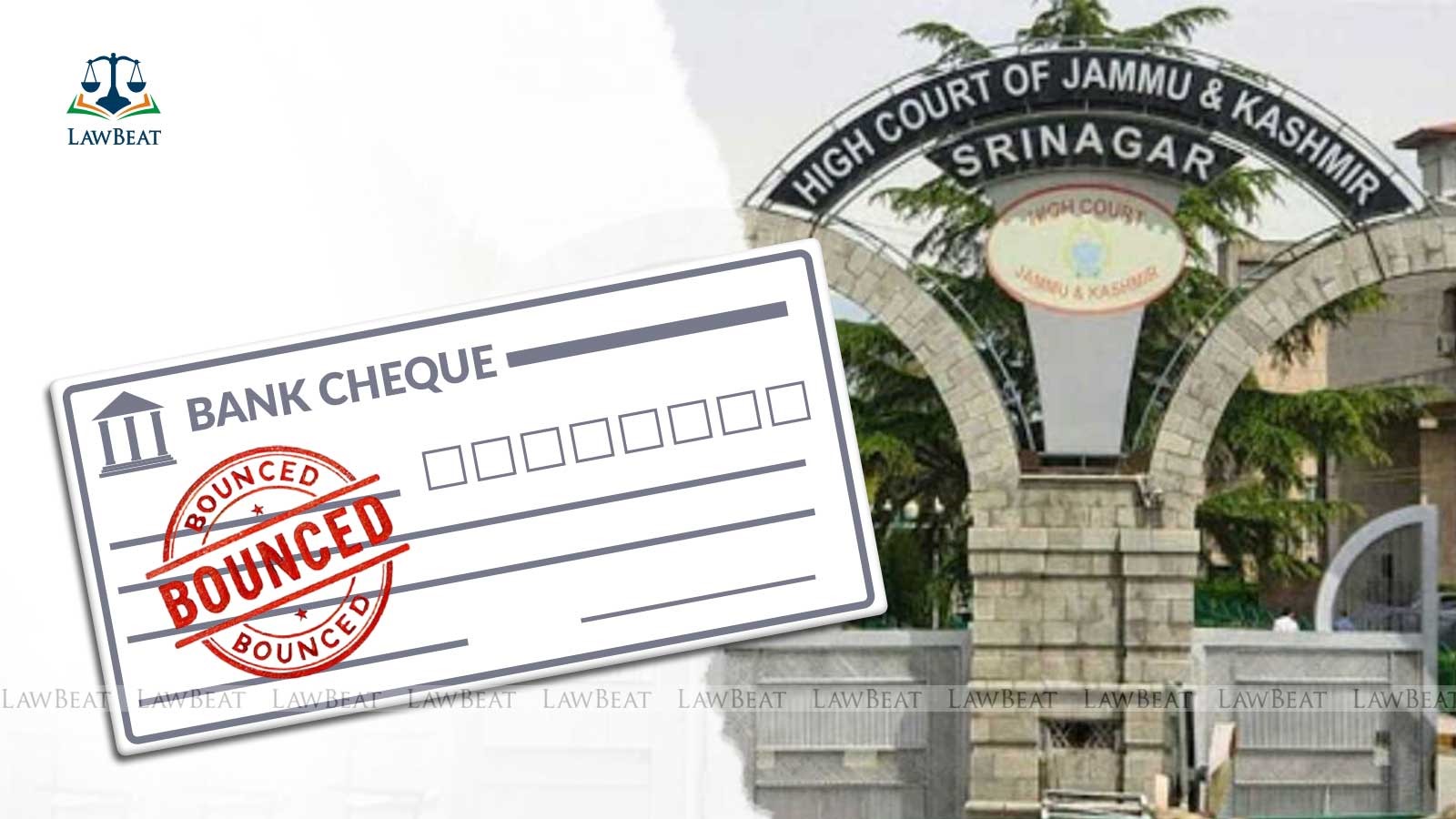Complaint Under Section 138 NI Act Maintainable Even if Cheque Bounces Due to Frozen Account : J&K and Ladakh HC

The Court noted that while Section 138 explicitly refers to insufficient funds or amounts exceeding arrangements with the bank, other reasons like account closure or payment stoppage fall under the same legal category
The Jammu & Kashmir and Ladakh High Court has held that a complaint under Section 138 of the Negotiable Instrument Act (NI Act) is maintainable even when a cheque is dishonoured due to the freezing of the drawer's account.
The judgment, delivered by Justice Rajnesh Oswal, set aside the order of the Revisional Court, which had quashed the complaint filed by the petitioner under Section 138 of the NI Act, 1881. The court noted : “This court is of the considered view that the complaint under section 138 of the Act is maintainable even if the cheque is dishonoured due to reason ‘Account frozen’.”
The court made the observation while hearing a plea wherein the petitioner, Sheikh Owais Tariq, a lender, filed a complaint against Satvir Singh (respondent) under Section 138 of the NI Act. The respondent had allegedly issued a cheque for ₹8,69,700, which was dishonoured on July 14, 2014, with the bank citing the reason "Account Frozen." The petitioner issued a statutory notice, which he claims was received by the respondent, but no payment was made within the stipulated time, prompting him to file the complaint.
The trial court took cognizance of the matter and issued process against the respondent on August 23, 2014. The respondent then filed an application seeking dismissal of the complaint, arguing that the cheque was dishonoured solely due to his account being frozen by investigative agencies, and that the complaint was not maintainable. The trial court rejected this application on November 4, 2017. Aggrieved, the respondent approached the Principal Sessions Judge, Srinagar (Revisional Court), which quashed the trial court’s orders on May 9, 2018, resulting in the dismissal of the complaint.
The petitioner, represented by Advocate Zahoor A. Shah, argued that the dishonor of a cheque due to a frozen account is still actionable under Section 138 of the NI Act. It was contended that the trial court had correctly issued process and that the Revisional Court erred in quashing the complaint prematurely without considering all the facts.
Contrarily, the respondent, represented by Advocate Ishfaq Bashir, contended that “the cheque was dishonored not because of the insufficient funds but because the bank account of the respondent was frozen by the Crime Branch and it was not because of the fault of the respondent that the cheque was dishonoured,” and therefore, the dishonor did not fall within the purview of Section 138. The respondent relied on several judgments, including ‘Mr. Kishore Shankar Singapurkar vs State of Maharashtra and Mafatlal’ (Bombay High Court), and ‘Vijay Choudhary vs Gyan Chand Jain’ (Delhi High Court), to argue that complaints under such circumstances are not maintainable.
The High Court, after reviewing the material on record, held that the Revisional Court’s finding was contrary to settled law. The court stated that “the Revisional Court was not right in returning the finding that the trial court had wrongly dismissed the application for dropping of the proceedings filed by the respondent herein.”
The court emphasised that the respondent had not claimed sufficient funds in the account or a lack of knowledge about the account being frozen when the cheque was issued. The revisional court, in the absence of such evidence, erroneously placed the burden on the petitioner to prove these facts.
Further, the court observed that “It is true that in terms of section 138 of the Act, the complaint for dishonour of cheque can be filed against the accused when the amount lying in the account of the accused is insufficient to honour the cheque or it exceeds the amount arranged to be paid from the account by an agreement made with that bank. Though these are the only two contingences provided by the statute for initiating the proceedings against the accused for dishonour of cheque, but there are numerous judicial pronouncements wherein it has been held that the accused can be prosecuted under section 138 of the Act for dishonour of cheques on account of account closed, payment stopped by the drawer, signature mismatch and image not found, as it would fall within the first contingency as provided under the Act.”
The court referred to the Supreme Court’s ruling in Laxmi Dyechem v. State of Gujarat (2012), which established that dishonour of cheques for reasons such as "Account Closed" or "Payment Stopped" falls within the ambit of Section 138. It noted that a frozen account similarly presupposes the existence of an account and is a valid ground for prosecution under the Act.
The court also observed that the respondent had not provided sufficient evidence to show that the freezing of the account was beyond his control or that he was unaware of the account's status when issuing the cheque. The court stated that “The learned Revisional Court has put the cart before the horse and has returned a finding which could have been returned only after the full-fledged trial,” emphasising that the Revisional Court erred in dismissing the complaint without a full trial, as the respondent’s arguments could only be properly examined after all evidence was presented.
Consequently, the court allowed the petitioner’s appeal, remanded the case to the trial court for further proceedings, while reinstating the trial court’s decision, holding that the complaint was maintainable.
Both parties were directed to appear before the trial court on September 19, 2024, to proceed with the case.
Cause Title: Sheikh Owais Tariq v Satvir Singh [CRMC No. 276/2018]
